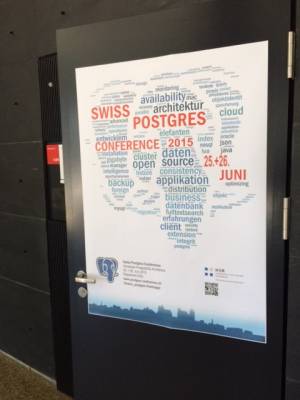At the 26th of June I had the chance to attend the second Swiss Postgres Conference at the HSR Rapperswil. It was packed with interesting sessions.

Magnus Hagander, a well known community member, started by giving an overview of PostgreSQL Europe. Then I joined Hans Schönig for learning how to write aggregate functions in PostgreSQL. Honestly I did not understand all of it but at least I am now aware of what you can do with that: Almost everything 🙂 I’ll try to write a blog about it in some days.
Markus Winand followed with “novercal indexes” (I hope the translation matches). The main cause of bad performance, according to Markus, is query/index mismatch. He pointed out that tuning in a lot of cases seems to be the responsibility of the DBA, but not the developer. So the DBA needs to tune statements a developer has written, which is time consuming and risky. Here is the link to his website: http://use-the-index-luke.com.
The next session I attended was “Postgres-XL vs Bi-Directional Replication” held by Markus Wanner. He started by explaining the basics (synchronous, asynchronous, consistency, multi-master). Then he gave an overview of several implementations: Postgres-XL, Postgres-XC, BDR.

After the lunch Marc Ballmer talked about “Securing your PostreSQL application – Measures to mitigate the effects of a database exploit, e.g. when you application has bugs”. This talk was all about security: Data stealing, data manipulation, data destruction. A nice comic about the topic is here.
Michael Rutz followed with “Breaking Security Barriers”. Again security topics but more related to roles, how they work and what you can do with them.
Magnus Hagander finished the technical sessions with “A TARDIS for your ORM – application level time travel in PostgreSQL”. This session was about implementing a system that allows selects on historical data, e.g. give me state for a person as it was 10 days ago (similar to oracle’s flashback data archive). This was implemented using range types, the tzrange in this case.
Conclusion: I will definitely join the next conference if I find the time for it. For getting new ideas, getting to know more and more people in the community this is the right place to be. By the way: Since a few months there is the Swiss PostgreSQL User-Group. Interested to join?
BE SHARING
![Thumbnail [60x60]](https://www.dbi-services.com/blog/wp-content/uploads/2022/08/DWE_web-min-scaled.jpg)
![Thumbnail [90x90]](https://www.dbi-services.com/blog/wp-content/uploads/2022/10/CWE_web-min-scaled.jpg)